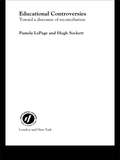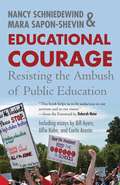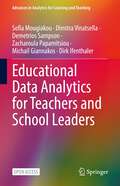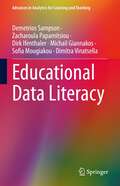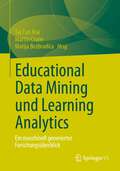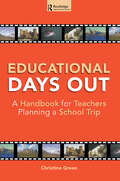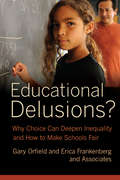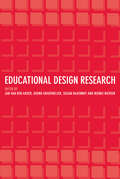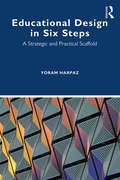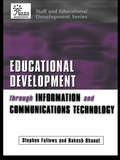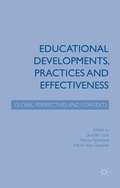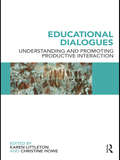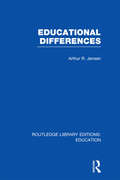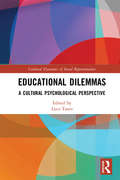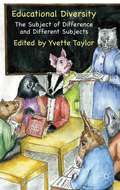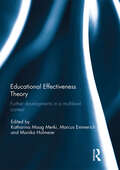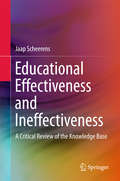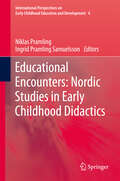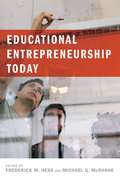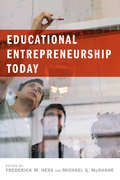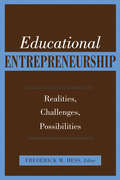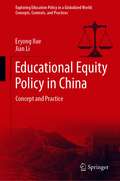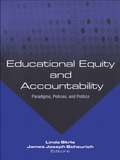- Table View
- List View
Educational Controversies Towards a Discourse of Reconciliation: Toward A Discourse Of Reconciliation
by Hugh Sockett Pamela LapageFor the last 100 years, people have argued vigorously about a vast number of educational issues. At the heart of the arguments lies the question: What is the purpose of education? This conflict of educational purpose has seen rifts between academics, educators, politicians and parents. The authors of this book don't believe the conflicts need to be so hysterical, nor that the oppositions are incompatible. Rather, that it is in the manner in which debate is conducted that is so damaging. In this book, the authors contend that there are political, social, moral and civic needs for a new stance to debate the way forward. Examining a number of key controversies in educational discourse the book suggests ways in which controversies may be reconciled by looking for interrelations, mutual dependencies and links of importance. It develops current debate and provides suggestions for developing nurturing and supportive learning communities and so lead to educational change.
Educational Courage: Resisting the Ambush on Public Education
by Mara Sapon-Shevin Nancy SchniedewindLost amid the debate over educational policies are the stories of the educators, parents, and students who are most affected by legislation such as No Child Left Behind and Race to the Top. In Educational Courage, veteran educators and activists Nancy Schniedewind and Mara Sapon-Shevin bring together the voices of those who are resisting market-driven initiatives such as high-stakes testing, charter schools, mayoral control, and merit pay. The diverse narrators who write in this volume confront the educational agendas that undermine teachers' judgment and knowledge, ignore the different backgrounds of students and parents, and debase the learning process. Yet these educators, parents, and activists also offer stories of resistance and hope as they fight to uphold the ideals of democratic public education.From the Trade Paperback edition.y stories of resistance--of educators, parents, and education activists fighting mightily to uphold the ideals of democratic public education. In doing so, they inspire others to do the same.From the Trade Paperback edition.litarian, democratic ideal in the sphere of public education.*70,000 wordsTo view a video of Macario Guajardo, whose story is told in Educational Courage, explaining why he became a conscientious objector against the Texas state standardized tests, go to http://www.youtube.com/watch?v=eCI8qgcdwQ4
Educational Data Analytics for Teachers and School Leaders (Advances in Analytics for Learning and Teaching)
by Dirk Ifenthaler Demetrios Sampson Michail Giannakos Zacharoula Papamitsiou Sofia Mougiakou Dimitra VinatsellaEducational Data Analytics (EDA) have been attributed with significant benefits for enhancing on-demand personalized educational support of individual learners as well as reflective course (re)design for achieving more authentic teaching, learning and assessment experiences integrated into real work-oriented tasks.This open access textbook is a tutorial for developing, practicing and self-assessing core competences on educational data analytics for digital teaching and learning. It combines theoretical knowledge on core issues related to collecting, analyzing, interpreting and using educational data, including ethics and privacy concerns. The textbook provides questions and teaching materials/ learning activities as quiz tests of multiple types of questions, added after each section, related to the topic studied or the video(s) referenced. These activities reproduce real-life contexts by using a suitable use case scenario (storytelling), encouraging learners to link theory with practice; self-assessed assignments enabling learners to apply their attained knowledge and acquired competences on EDL. By studying this book, you will know where to locate useful educational data in different sources and understand their limitations; know the basics for managing educational data to make them useful; understand relevant methods; and be able to use relevant tools; know the basics for organising, analysing, interpreting and presenting learner-generated data within their learning context, understand relevant learning analytics methods and be able to use relevant learning analytics tools; know the basics for analysing and interpreting educational data to facilitate educational decision making, including course and curricula design, understand relevant teaching analytics methods and be able to use relevant teaching analytics tools; understand issues related with educational data ethics and privacy.This book is intended for school leaders and teachers engaged in blended (using the flipped classroom model) and online (during COVID-19 crisis and beyond) teaching and learning; e-learning professionals (such as, instructional designers and e-tutors) of online and blended courses; instructional technologists; researchers as well as undergraduate and postgraduate university students studying education, educational technology and relevant fields.
Educational Data Literacy (Advances in Analytics for Learning and Teaching)
by Dirk Ifenthaler Demetrios Sampson Michail Giannakos Zacharoula Papamitsiou Sofia Mougiakou Dimitra VinatsellaDigital Education is recognised as a key transformative innovation for K-12 school and university teaching and learning, as well as, for professional development and vocational training. As a result, blended and online courses are nowadays widely deployed to meet the needs of K-12, higher education and vocational training students, as well as, the needs for professional development of in-service professionals. In this context, important professional roles in digital education and training, such as, the Instructional Designers, who design and develop online and blended courses, and the Trainers or Tutors who support the delivery of these online and blended courses, require new professional competences compared to those assumed at the traditional face to face education and tra ining programs.This is particularly relevant today, in the post Covid-19 era, where educational organisations, leaders and teachers are challenged with reinventing their teaching and learning environments to offer higher quality, more accessible and inclusive teaching, learning and assessment. Educational Data Literacy (EDL) is a core competence for all education professionals, including school teachers, instructional designers and tutors of online and blended learning courses, as well as educational institutions' leaders. Nevertheless, existing professional competence frameworks for educators pay little attention to EDL, missing out the potential of using emerging EDL methods and tools in online and blended teaching and learning - thus there is a need for extending existing professional competence frameworks for educators with new competences to accommodate the emerging field of EDL. To this end, this brief monograph presents a comprehensive proposal of an Educational Data Literacy Competence Profile (EDL-CP) framework for education professionals, as well as, exemplary learning outcomes for the proposed EDL-CP framework, and use-case examples for indicative target groups, namely instructional designers, e-Trainers and K-12 school teachers. The work of this book has been produced within the project "Learn2Analyze — An Academia-Industry Knowledge Alliance for enhancing Online Training Professionals’ (Instructional Designers and e-Trainers) Competences in Educational Data Analytics" which is co-funded by European Commission through the Erasmus+ Program (Cooperation for innovation and the exchange of good practices – Knowledge Alliances).
Educational Data Mining und Learning Analytics: Ein maschinell generierter Forschungsüberblick
by Tai Tan Mai Martin Crane Marija BezbradicaDas Buch bietet einen umfassenden Überblick über den neuesten Stand der Forschung auf dem Gebiet des Data Mining im Bildungswesen und seiner Anwendungen. Es richtet sich an ein Publikum mit unterschiedlichem Hintergrund von Informatiker:innen bis zu Bildungsphilosoph:innen.
Educational Days Out: A Handbook for Teachers Planning a School Trip
by Green, ChristineDetailing how to plan and prepare for a school trip, this text provides advice on the right and wrong way to approach trips that will both educate and entertain. A directory of places of interest grouped into subject-specific sections is included.
Educational Delusions?
by Erica Frankenberg Gary OrfieldThe first major battle over school choice came out of struggles over equalizing and integrating schools in the civil rights era, when it became apparent that choice could be either a serious barrier or a significant tool for reaching these goals. The second large and continuing movement for choice was part of the very different anti-government, individualistic, market-based movement of a more conservative period in which many of the lessons of that earlier period were forgotten, though choice was once again presented as the answer to racial inequality. This book brings civil rights back into the center of the debate and tries to move from doctrine to empirical research in exploring the many forms of choice and their very different consequences for equity in U.S. schools. Leading researchers conclude that although helping minority children remains a central justification for choice proponents, ignoring the essential civil rights dimensions of choice plans risks compounding rather than remedying racial inequality.
Educational Design Research
by Koeno Gravemeijer Susan McKenney Jan Van Den Akker Nienke NieveenThe field of design research has been gaining momentum over the last five years, particularly in educational studies. As papers and articles have grown in number, definition of the domain is now beginning to standardise. This book fulfils a growing need by providing a synthesised assessment of the use of development research in education. It looks at four main elements: background information including origins, definitions of development research, description of applications and benefits and risks associated with studies of this kind how the approach can serve the design of learning environments and educational technology quality assurance - how to safeguard academic rigor while conducting design and development studies a synthesis and overview of the topic along with relevant reflections.
Educational Design in Six Steps: A Strategic and Practical Scaffold
by Yoram HarpazThe conviction that the traditional educational institutions do not cohere with the values and challenges of our age has become commonplace, yet efforts of governments, organizations and individuals have yet to produce a convincing alternative framework. Educational Design in Six Steps addresses this urgent need, providing a theoretical and practical framework for redesigning and revolutionising any educational environment, across primary, secondary and tertiary education. Offering a new philosophical perspective firmly grounded in the practical, the analysis in this book is framed in terms of six steps, all designed to promote fertile dialogue and planning, so as to benefit not only the objects of our educational enterprises, but also society as a whole. The book provides an understandable typology for setting goals, customising and adapting educational environments, and aligning classroom practice with educational theory and organisational design, offering concrete examples and probing discussion questions throughout. The book is an essential guide for school leaders, administrators, postgraduate students and anyone working to create or reimagine their distinctive educational environments.
Educational Development Through Information and Communications Technology (SEDA Series)
by Stephen Fallows Rakesh BhanotInformation and Communications Technology (ICT) has proved to be one of the key drivers of change in education. In higher education particularly, ICT is enabling educators, educational developers and institutions to 'reach out' to learners, using innovative approaches based on the flexibility, accessibility and diversity that it offers.This book is based on the experiences of expert educational developers from the UK, United States, Canada, South Africa and Malaysia. It considers the ways in which ICT can be used to enhance learning both on and off campus, and how educators and institutions have tackled the issues associated with the adoption of new approaches and technologies. However, as the development of new technology is relentless, the book recognizes that ICT is not a panacea in itself -- good teaching remains crucial to good education. With this in mind, the contributors address issues beyond 'technology', looking at the importance of teaching and at the skills of teachers themselves if ICT is to be truly successful. Coverage is grouped into four key themes:*strategic issues for ICT initiatives*introducing ICT into the classroom*using ICT in practice*using ICT in learning and educational supportInternational in scope, and written by educators and educational developers rather than by technologists, this book is intended to be accessible to anyone with a critical interest in improving education through the use of ICT. It will be of particular interest to staff and educational developers, ICT coordinators, course leaders and course developers.
Educational Developments, Practices and Effectiveness
by Patrick Alan Danaher Petrea Redmond Jennifer LockExploring a range of educational developments and practices in different national contexts in Australia, Canada and Switzerland, this book analyses the effectiveness of such initiatives. Case studies in the book include business and online education, supporting students with disabilities and school-wide pedagogical improvement.
Educational Dialogues: Understanding and Promoting Productive interaction
by Karen Littleton Christine HoweEducational Dialogues provides a clear, accessible and well-illustrated case for the importance of dialogue and its significance for learning and teaching. The contributors characterise the nature of productive dialogues, to specify the conditions and pedagogic contexts within which such dialogues can most effectively be resourced and promoted. Drawing upon a broad range of theoretical perspectives, this collection examines: theoretical frameworks for understanding teaching and learning dialogues teacher-student and student-student interaction in the curricular contexts of mathematics, literacy, science, ICT and philosophy the social contexts supporting productive dialogues implications for pedagogic design and classroom practice. Bringing together contributions from a wide range of internationally renowned researchers, this book will form essential reading for all those concerned with the use of dialogue in educational contexts.
Educational Differences (Routledge Library Editions: Education)
by Arthur JensenAmong particular issues discussed in this book are the problems of the cultural disadvantaged, the problems of devising psychological tests which are not biased towards any particular culture, the problems of minority groups of children in education and the relationship between heritability and teachability.
Educational Dilemmas: A Cultural Psychological Perspective (Cultural Dynamics of Social Representation)
by Luca TateoEducational Dilemmas uses cultural psychology to explore the challenges, contradictions and tensions that occur during the process of education, with consideration of the effect these have at both the individual and the collective level. It argues that the focus on issues in learning overlooks a fundamental characteristic of education: that the process of educating is simultaneously both constructive and disruptive. Drawing on research from Europe, America and Asia, chapters in this volume present and analyse different experiences of the tension between disruption and construction in the process of education. Situating educational discontent within the wider context, the book demonstrates how this issue can be exacerbated by the tension between the commodification and democratisation of educational systems. This book demonstrates that these issues permeate all levels of education and, as a result, emphasises how vital it is that educational discontent is considered from a new perspective. Educational Dilemmas is essential reading for academics, researchers and postgraduate students in the fields of psychology and education. It should also be of great interest to school psychologists, teachers and therapists.
Educational Dimensions of School Lunch: Critical Perspectives
by A. G. Rud Suzanne RiceSchool lunch is often regarded as a necessary but inconvenient distraction from the real work of education. Lunch, in this view, is about providing students the nourishment they need in order to attend to academic content and the tests that assess whether content has been learned. In contrast, the central purpose of this collection is to examine school lunch as an educational phenomenon in its own right. Contributing authors—drawing from a variety of disciplinary traditions, including philosophy, sociology, and anthropology—examine school lunch policies and practices, social and cultural aspects of food and eating, and the relation among school food, the environment, and human and non-human animal well-being. The volume also addresses how school lunch might be more widely conceptualized and practiced as an educational undertaking.
Educational Diversity
by Yvette TaylorThis collection explores the relationship between new equality regimes and continued societal inequalities, exploring change, ambivalence and resistance specifically in relation to compulsory and post-compulsory education, seeking to more fully situate the educational journeys and experiences of staff and students.
Educational Effectiveness Theory: Further developments in a multilevel context
by Katharina Maag Merki Monika Holmeier Marcus EmmerichDespite the advances in educational effectiveness theory and methodology in the last 20 years, important questions and issues remain unresolved. In particular, existing theoretical frameworks of educational effectiveness are only able to describe the interrelationship among factors at the system, school, classroom, and student levels and their cross-level interdependency in a very general manner. Additionally, although a large number of studies provide empirical evidence of the impact of single factors and factor constellations on student learning, the embedding of the empirically identified results in theoretical models of educational effectiveness has to be carried out more systematically in order to develop more elaborated theories of educational effectiveness. The aim of this book is to contribute to the advancement of educational effectiveness theory by discussing different strategies: including alternative theoretical models to understand educational in/effectiveness, extending the methodology to analyze processes and mechanisms of educational in/effectiveness, analyzing differential effects of processes and instruments on educational in/effectiveness, carrying out complex multivariate analyses considering manifest and latent variables, and combining theory and practice in real school situations. Taken together, the strategies presented in this book make it clear that the advancement of educational effectiveness theory depends on the advancement of educational effectiveness methodology, or in other words: from theory to methodology and from empirical evidence back to theory. This book was originally published as a special issue of School Effectiveness and School Improvement.
Educational Effectiveness and Ineffectiveness
by Jaap ScheerensThis book is a critical assessment of the knowledge base on educational effectiveness, covering a period of five decades of research. It formulates a "lean" theory of good schooling, and identifies and explains instances of "ineffectiveness", such as low effect sizes of malleable conditions, for which expectations are highly strung. The book presents a systemic outlook on educational effectiveness and improvement, as it starts out from an integrated multi-level model that comprises system level, school level and instructional conditions. It offers a classification of school improvement strategies and scenarios for system level educational improvement. Above all, the analysis is very systematic, comprehensive and strongly grounded in theory. The book includes a case study analysis of various strands of improvement-oriented educational policy in the Netherlands as an illustration of some of the arguments used.
Educational Encounters: Nordic Studies in Early Childhood Didactics
by Ingrid Pramling Samuelsson Niklas PramlingQualitative analyses of young children's learning in natural settings are rare, so this new book will make educators sit up and pay attention. It lays out a Nordic, or continental European teaching and learning paradigm whose didactic framework is distinct from the Anglo-American system. This analysis, which features contributions and case studies from researchers in a range of subjects, is built on principles such as the learner's perspective, establishing sufficient intersubjectivity, 'pointing out', and informing experience linguistically. After clarifying some historical background, the book discusses the contemporary emphasis in early childhood education on pedagogy/learning. What should 'didactics' mean in educating young children? The book examines the opportunities for learning that teachers provide for children in early childhood education, as well as how children respond to these opportunities. It presents empirical studies from a variety of naturalistic settings, including mathematics, making visual art, ecology, music, dance, literacy and story-telling, as well as learning about gender, morality and democracy. The authors seek to answer key questions about the processes involved in both teaching and learning. What challenges do teachers face as they try to expand children's knowledge in various fields of learning? How do they respond to these challenges, and what can we learn about children's corresponding uptake? What now requires further research? One key distinction in researching children's learning is between studies that look at 'process' and those that analyze 'product'. In the tradition of Piaget, Vygotsky and Werner, as well as Mercer and Valsiner's more recent work, this book advocates the importance and relative rareness of the former type of study.
Educational Entrepreneurship Today (Educational Innovations Series)
by Frederick M. Hess Michael Q. McShaneIn this book, Frederick M. Hess and Michael Q. McShane assemble a diverse lineup of high-profile contributors to examine the contexts in which new initiatives in education are taking shape. They inquire into the impact of entrepreneurship on the larger field―including the development and deployment of new technologies―and analyze the incentives, barriers, opportunities, and tensions that support or constrain innovation. The book offers critical perspectives on the impact of entrepreneurship and also includes lessons from leading entrepreneurs, in which they use case studies drawn from their own experience to illustrate the realities of leading disruptive change in education and pose guiding questions for the next generation of innovators. In a time of increasing polarization around education policy, this timely, frank, and insightful volume shows how we can begin to create systems in which entrepreneurial ideas and fresh thinking are welcomed, constructively employed, and held accountable for the public good.
Educational Entrepreneurship Today (Educational Innovations Series)
by Frederick M. Hess and Michael Q. McshaneIn Educational Entrepreneurship Today, Frederick M. Hess and Michael Q. McShane assemble a diverse lineup of high-profile contributors to examine the contexts in which new initiatives in education are taking shape. They inquire into the impact of entrepreneurship on the larger field—including the development and deployment of new technologies—and analyze the incentives, barriers, opportunities, and tensions that support or constrain innovation. Over the past decade, entrepreneurship has moved from the periphery to the center of education reform. Policy measures, philanthropic support, and venture capital increasingly promote initiatives that drive innovation within and outside the traditional education sector. These initiatives have included spectacular successes, like Khan Academy, Teach For America, and Wireless Generation, as well as highly visible failures, like the InBloom data warehouse.Educational Entrepreneurship Today offers critical perspectives on the impact of entrepreneurship and also includes lessons from leading entrepreneurs, in which they use case studies drawn from their own experience to illustrate the realities of leading disruptive change in education and pose guiding questions for the next generation of innovators. In a time of increasing polarization around education policy, this timely, frank, and insightful volume shows how we can begin to create systems in which entrepreneurial ideas and fresh thinking are welcomed, constructively employed, and held accountable for the public good.
Educational Entrepreneurship: Realities, Challenges, Possibilities
by Frederick M. HessThis lively and provocative book introduces this burgeoning field for readers concerned with K-12 education in the United States--and with efforts to reform and improve it. Entrepreneurship has emerged in recent years as an unprecedented and influential force in U.S. K-12 education. Yet the topic has received surprisingly little serious or systematic attention. Educational Entrepreneurship aims to fill this gap. This timely volume addresses a number of central questions: What is educational entrepreneurship and what does it look like? Who are the educational entrepreneurs and what motivates them? What tools do entrepreneurs need to be successful? What policies or practices enable or impede entrepreneurship? What would it mean to open up the education sector to more entrepreneurial activity? An interesting and admirable range of contributors offers clusters of articles on the nature of educational entrepreneurship; the political, policy, and legal contexts that face educational entrepreneurs; various models of entrepreneurial activity; the role of for-profit organizations in K-12 education; and possible future directions for educational entrepreneurs.
Educational Equality and International Students: Justice Across Borders?
by Stuart TannockIn an increasingly globalised educational landscape, this book examines whether the principle of educational equality can be applied across nation state borders. Exploring the tension between the theory of educational equality and the reality that most educational institutions are rooted in local communities and national frameworks, the author thus probes the consequences for institutions, individuals and communities as the number of international students grows exponentially. A topic that has previously received limited attention, the author draws upon theoretical literature and an empirical study of how universities in the United Kingdom conceptualise and promote principles of educational equality for international as compared with home students. This pioneering work will be interest and value to students and scholars of international education, international students, educational equality and globalisation, as well as practitioners and policy makers.
Educational Equity Policy in China: Concept and Practice (Exploring Education Policy in a Globalized World: Concepts, Contexts, and Practices)
by Jian Li Eryong XueThis book investigates the educational equity in China from multiple perspectives, including rural and urban educational equity, interschool educational equity, Eastern and Western educational equity and administrative policies related to the educational equity. All those perspectives concentrate on examining the comprehensive development of the educational equity in contemporary China. In addition, this book also presents specific historical and cultural shifts for policymakers and stakeholders to offer an in-depth understanding of the educational equity strategy in a long term.
Educational Equity and Accountability: Paradigms, Policies, and Politics (Studies in Education/Politics)
by Linda Skrla James Joseph ScheurichDespite the intense political attention that has been focused on accountability, on standardized testing, and on the equity effects of both accountability and testing, the great majority of recent debate in education policy circles has failed to attend to either the dynamism or complexity of these issues and has, instead, been carried out in a dualistic, good versus evil, fashion. In contrast, the scholarship collected in this important new volume is designed to move beyond the prevailing dualism and to push the discourse about accountability, testing, and educational equity in public schools usefully forward, and to provide a much-needed resource for researchers, policy makers, and practitioners.
